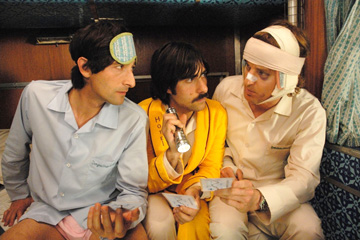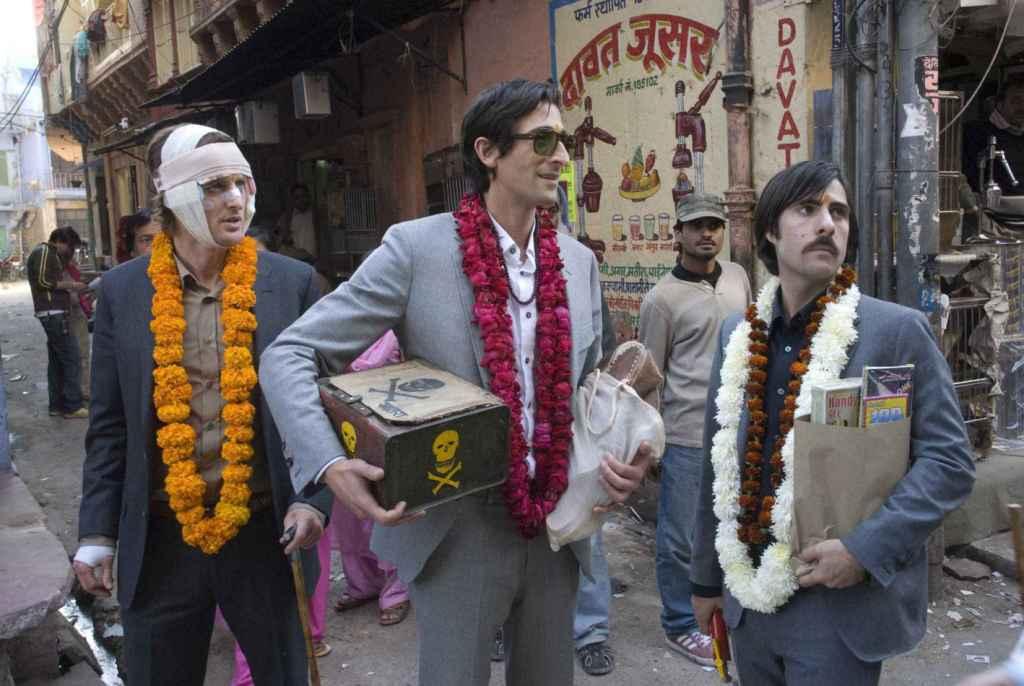
If you’ve ever seen a Wes Anderson movie, you probably already know if you’ll like
The Darjeeling Limited or not. For better or worse, this one is right in his wheelhouse — It is to India and trains what
The Life Aquatic with Steve Zissou was to Cousteau and boats. I felt pretty much the same about this film as I did about
Aquatic — It’s vaguely engaging and mildly diverting at times, but it doesn’t really add up to much, and is basically an excuse for Anderson to parade
his usual indulgences for ninety minutes. (Nor is
Limited as fresh as
Rushmore or as occasionally moving as his best film,
The Royal Tenebaums.) I mean, if Wes is your quirky-precious Louis Vuitton bag, don’t let me ruin the fun. But if he isn’t, I suggest taking a plane instead.
Somewhere on the Indian subcontinent, at what passes for rush hour, a flustered American in Organization Man garb (Bill Murray) tries to will his careening taxi through a typically chaotic Third World marketplace, in the vain hope that he can reach his train — the spiffy Darjeeling Limited — on time. Unfortunately for him, this is not his story. Rather, we follow the travails of the three Whitman brothers on this colorful locomotive, who’ve reunited one year after the untimely death of their father to partake in a journey of spiritual bonding. Jack (Jason Schwartzman), the youngest of the three, is currently writhing on the horns of a messy break-up (See The Hotel Chevalier.) Peter (Adrien Brody), the middle brother with a klepto streak, is wrestling with the dilemma of imminent (and seemingly unwanted) fatherhood. And Frances (Owen Wilson), the oldest brother and planner of the trip, is recovering from what looks to have been a self-induced motorcycle accident. (Plus, he’s a bit of a martinet.) These three reluctantly experience the scenic wonders of India at first, spending most of their time quibbling and bickering in fraternal fashion. But, eventually, a tragedy along their travels shakes the trio out of their touristy complacency. And, once they find (a la 3:10 to Yuma) that the train of life can come to an abrupt stop at any time, will the Whitmans then rise above their individual problems and learn the immortal spiritual truth that “brothers gotta hug?” Well, I’ll leave that for you to discover.
And that’s about it, folks…There’s not much else here to speak of. (In fact, the experience of The Darjeeling Limited was almost completely encapsulated by watching the trailer, from the basic outline of the plot to the general mood and rhythm of the film.) I will say that Adrien Brody, fun to watch on most occasions, comes across as right at home in the Andersonverse. And Owen Wilson, whose injuries can’t help but remind us of recent events in his real life, adds a haunted dimension to his character simply by his presence. Still, Darjeeling is a lark — Even with the funeral in the middle going (I’ll let others do the bashing about the dead-anonymous-native-kid-as-plot-point — I’ll confess it did seem a bit off), The Darjeeling Limited has no scene approaching the power of, say, the quietly devastating suicide attempt in Tenenbaums, and no turn as memorable as those of Bill Murray or Olivia Williams in Rushmore. Wes Anderson has shown in the past that he can tell a moving, dramatic story using his signature style. But, Darjeeling is just a rich kid playing with his train set.



